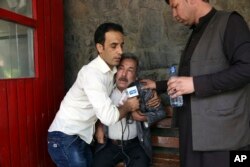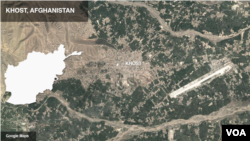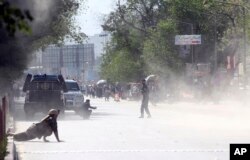A twin suicide bombing Monday in Afghanistan’s capital Kabul killed at least 26 people, including nine journalists. At least 50 people were wounded, including five journalists.
Islamic State through its Amaq news agency claimed responsibility for the deadliest ever assault on media workers in Afghanistan.
Local media watchdog, Afghan Journalist Safety Committee (AJSC), while confirming the media-related fatalities, strongly condemned the attack.
Two female journalists, including Maharram Durrani from RFE/RL, were among the dead. French news agency AFP has confirmed the death of its chief photographer in Kabul, Shah Marai. Two male staffers from RFE, Abadullah Hananzai and Abawoon Kakar, were also killed.
A leading Afghan television station, 1 TV News, has also confirmed the killing of two staffers in Monday's attack.
Afghan authorities and witnesses said the attack began during early morning rush hour with a suicide bomber on motorbike blowing himself up near an office of the National Directorate of Security, the country’s intelligence agency.
When rescue workers and media crews gathered at the site minutes later, a second bomber disguised as a journalist detonated explosives strapped to his body, causing most of the casualties, said Kabul police spokesman Hashmat Istanikzai.
In a statement, VOA said it was saddened by the loss of journalists from its sister network, RFE/RL, in the Kabul blasts. "We join RFE/RL President Thomas Kent in deploring this cowardly act against non-combatants and extend our deepest condolences to the families of all of those who lost their lives in today's deadly attacks. With World Press Freedom Day on May 3, today's tragedy is a reminder of the dangers that journalists face every day to bring global audiences accurate, objective and reliable news," the statement said.
John Lansing, the CEO of the Broadcasting Board of Governors (BBG), the parent organization for the Voice of America, said "Just days before World Press Freedom Day, journalists were targeted for their role in gathering and reporting unbiased news and information to the people of Afghanistan."
General John Nicholson, who commands U.S. forces and NATO's non-combatant mission in the country, said, "We condemn in the strongest terms possible the cowardly attacks in Kabul by two suicide bombers that killed and injured Afghan forces and innocent Afghan citizens, including journalists."
And U.S. Secretary of State Mike Pompeo said that despite the attack, "the vibrant media landscape that has developed in Afghanistan will endure, in large part due to those journalists and media professionals who tragically died in today's attack, but whose courageous and steadfast work helped lay the foundation for Afghanistan's thriving and resilient independent media."
Hours after the attack in Kabul, unknown gunmen killed a local BBC journalist, Ahmad Shah, in the border city of Khost.
The Afghan Taliban issued a statement denying involvement in the attacks in Kabul and Khost.
Deterioration of security across Afghanistan has added to challenges of journalists working in the country, with at least 15 of them killed in 2017, many in targeted attacks on the media.
"By sowing terror in some regions, the Taliban and Islamic State militants have created information black holes," said Reporters Without Borders in its annual report issued last week.
In some Afghan provinces, it said, the Taliban forced the media to pay arbitrary taxes that were tantamount to ransoms.
"Many governors and local officials are meanwhile unable to accept the principle of media independence, and the police and military have been implicated in several cases of violence against journalists," the report said.
Meanwhile, Afghan officials said a suicide car bombing killed at least 11 people in southern Kandahar province and wounded 16 others, including five Romanian soldiers. An area police spokesman told VOA the attack targeted a foreign forces convoy. He added that those killed were all students at a nearby religious seminary, or madrasa.
NATO's Resolute Support mission later confirmed the vehicle-born explosive device wounded eight of its service members. They are all in stable condition, a mission statement noted.
In addition, several Afghan police and Afghan civilians, including an apparent group of children, were either killed or wounded in the blast, it said.
"Our thoughts and prayers are with those wounded, and with the innocent Afghans whose lives were needlessly taken from them by the enemies of Afghanistan," the statement quoted General Nicholson as saying.
The statement did not identify nationalities of the wounded soldiers, but pointed out that the Romanian Ministry of National Defense has confirmed that the service members involved were Romanian.
There were no immediate claims of responsibility for the bombing in Kandahar where the U.S.-military operates a major base. Southern Afghan provinces are where Taliban insurgents control vast territory and frequently stage attacks on local forces and their international counterparts.








